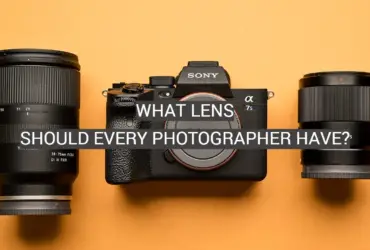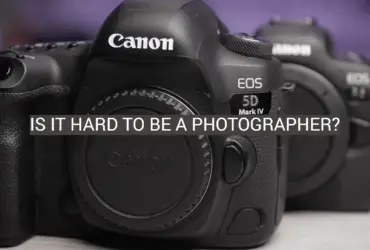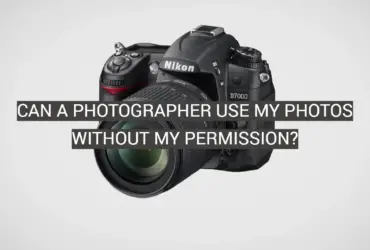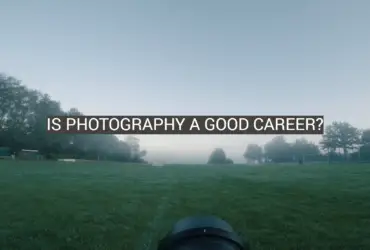Are you looking to become a professional photographer? It’s an exciting and rewarding career path that can take you to many different places. But getting there requires more than just possessing a natural-born talent – it also requires having the right degree and qualifications. This comprehensive guide will explore what specific degree you need to be a photographer, as well as the skills needed to become successful in the field. So, if you’re ready to jumpstart your photography career, read on!
What is a photographer?

Photographers possess a wide range of expertise, specializing in diverse types of photography. From the vast landscapes that take the breath away, to the intimate and soulful portraits that reveal the depth of human emotions, they have the ability to capture it all. They excel in documentary photography, capturing the essence of real-life events and narratives. They work their magic in glamor and fashion photography, transforming their subjects into ethereal beings. They excel in product photography, showcasing the finest details and attributes of various items.
Moreover, photographers possess knowledge and skills in crucial areas such as lighting, composition, and image manipulation. They understand the importance of lighting in creating the desired mood and atmosphere in a photograph. They have a keen eye for composition, ensuring that every element in the frame harmoniously contributes to the overall visual impact. They are proficient in image manipulation techniques, using software tools to enhance and refine their photographs, ultimately creating stunning masterpieces.
In essence, photographers are not simply artists, but creators of visual poetry. They are the storytellers who freeze moments, evoke emotions, and immortalize the beauty that is around [1].
What is a Photography Degree?
A photography degree is a comprehensive academic program meticulously designed to provide students with an in-depth understanding of the art and science of photography. Through a profound exploration of the fundamentals, aspiring photographers acquire the necessary expertise to not only excel but truly thrive in this dynamic and ever-evolving creative field.
These programs offer a rich and diverse curriculum, covering a wide spectrum of topics that go beyond surface-level techniques. From mastering composition techniques to unraveling the intricate play of lighting, from delving into the realms of advanced digital photography to unraveling the art of Photoshop and other image manipulation techniques, these programs leave no stone unturned. Moreover, they delve into the nuanced world of portraiture and beyond, allowing students to discover the boundless possibilities that lie ahead.
A photography degree can come in many forms, such as an Associate’s Degree, Bachelor’s Degree or Master’s Degree. For those looking to just dip their toes into the world of photography, there are also certificates and diplomas available which provide a more focused education on the subject.
In conclusion, there are various levels of photography degrees available to suit any photographer’s individual needs and goals. With a formal education in this field, photographers can gain the skills and knowledge necessary for creating stunning visuals that will wow clients and stand out in the industry.
With a photography degree in hand, individuals possess the tools not only to pursue a fulfilling and professional career in the industry but also to refine and enhance their artistic skills, enabling them to capture the world through their unique lens with unparalleled depth and brilliance.

Why is education necessary to work in photography?
Photography is an ever-evolving field, and staying ahead of the curve requires a commitment to ongoing education. A photography degree can help photographers stay on top of new technologies, trends, and techniques which are all essential for staying relevant in this competitive market. With a formal education, photographers can gain knowledge that allows them to create beautiful images with finesse and accuracy. With a degree, they can also gain access to specialized software and equipment that will give them a leg up on their competition.
Overall, having a photography degree is beneficial for career advancement and staying competitive in the industry. It gives photographers the knowledge and skills needed to create stunning visuals that can be used for anything from advertising campaigns to editorial projects. Additionally, it teaches photographers the principles of art and design that can be used to make a statement in each shot.
Having a degree also opens doors for professional networking opportunities that can help photographers meet and collaborate with other creative professionals. With the right network, photographers can create more meaningful work, which will help them stand out in the industry and grow their client base. Finally, having a degree shows potential employers that photographers have invested in their craft and are serious about pursuing a photography career.
In conclusion, getting a formal education in photography is essential for staying ahead of the curve and finding success in this exciting field. With the right skill set, networking opportunities, and passion, photographers can make an impact on the industry while also creating beautiful works of art.
Educational options for photographers
Certificate program in photography
For aspiring photographers who want to learn the basics and develop a strong foundation in photography, a comprehensive certificate program can be the perfect option. In this type of program, students not only gain knowledge about camera operation and techniques, but also delve into the intricacies of lighting principles, digital image editing, and other essential aspects of photography. Moreover, depending on the school or organization offering the program, there may be additional courses that focus on professional practices within the industry, equipping students with invaluable insights into the business side of photography.
By completing a certificate program, photographers not only acquire a solid understanding of the fundamentals but also gain the confidence to pursue more advanced opportunities in this dynamic and exciting field. With comprehensive training and a robust skill set, they are well-prepared to embark on a successful and fulfilling journey in the world of photography.

Associate degree in photography
An associate degree in photography provides a more comprehensive education compared to a certificate program. This type of program delves deeper into the theories and concepts behind capturing images, as well as providing students with valuable hands-on experience. In addition to core classes focusing on topics such as camera operation, lighting principles, and digital editing, some courses cover areas like business practices, copyright law, and marketing.
By completing an associate degree in photography, students gain a comprehensive understanding of the field while also building a solid foundation for the future. This is ideal for those looking to pursue higher education or explore career opportunities in fields such as commercial photography or photojournalism. The knowledge and skill set acquired throughout this type of program proves invaluable for professional photographers and provides them with the confidence to tackle any job.
Bachelor’s degree in photography
For those who want to take their career further, pursuing a bachelor’s degree in photography is an excellent option. In this type of program, students explore the creative aspects of photography as well as develop technical skills in areas such as design fundamentals and post-production techniques. Moreover, students also gain insight into the marketing side of photography, learning how to promote their work effectively and build a successful career.
Bachelor’s degree programs are designed to take approximately four years to complete, giving students ample time to gain knowledge and hone their skills. By the end of the program, graduates are well-equipped with a comprehensive understanding of photography techniques as well as an in-depth insight into the business side of the industry. With such expertise, they are prepared to pursue rewarding careers in photography.
Master’s degree in photography
For photographers looking to take their skills and knowledge to the next level, a master’s degree in photography may be the best option. In this type of program, students explore advanced concepts related to photography such as composition, color theory, lighting principles, and digital post-production techniques. Moreover, they also gain insight into how to craft meaningful narratives through imagery and develop strategies for effectively marketing their work.

Furthermore, master’s degree programs in photography typically provide advanced training and insights into the industry that can help graduates stand out from other professionals. With such expertise, they are well-prepared to pursue high-level positions within the field of photography [2].
Continuing education courses for photographers
For experienced photographers looking to stay up to date with the latest trends and technologies in the field, continuing education courses can be a great option. These types of courses are designed to provide experienced photographers with an insight into new techniques and approaches, as well as help them refine their skills and knowledge. Depending on the organization or school offering these courses, they may also cover topics such as business practices, copyright law, and marketing strategies.
Continuing education courses are perfect for professional photographers who want to stay competitive and boost their career prospects. Such courses can help them stay updated on the latest trends in the industry while building a strong foundation of knowledge that they can use to further their professional goals.
Benefits of an education in photography
If you are considering an education in photography, there are many benefits to earning a degree. A photography degree can open up opportunities for creative expression as well as the professional prestige of working with leading photographers and clients. It can also provide valuable insight into the world of art and help students develop their own unique style.
The skills learned in a photography program can open up many career opportunities. Photographers are in high demand for commercial and corporate jobs, editorial assignments, fashion photography, advertising campaigns, and more. With the right degree, you may be able to land a job in a prestigious studio or an advertising agency.
Having an education in photography can also give you an edge when it comes to networking. You’ll have the opportunity to meet people who can help you find jobs and assignments. Your education can also provide a foundation for success in any creative field, from filmmaking, web design, and graphic design to fashion merchandising and advertising photography.

By studying alongside other photographers, you will gain insight into different techniques and approaches to photography. This can lead to a better understanding of the art form, as well as more creative solutions to any problems you may run into during your career [3].
Photography Schooling Requirements
An aspiring photographer must be equipped with the right knowledge and skills to succeed in their field. This includes a thorough understanding of camera settings, composition techniques, photo editing software, and the business side of photography. To become a professional photographer, however, one must gain an education from accredited photography programs.
In most states and countries, there is no specific degree required to become a photographer. However, having some formal education in photography and related fields can be very beneficial. Most Photography degrees are courses on digital image processing, studio lighting techniques, art history and aesthetics, business principles, copyright law, and the fundamentals of professional photography.
For those who wish to specialize in a particular type of photography, there are even more specialized courses available. For example, those interested in wedding photography may take classes on posing and composition for portraits, while wildlife photographers can learn more about animal behavior and environmental issues.
In addition to formal schooling, it is important to stay up-to-date with the latest technology and trends in the field of photography. Keep track of digital camera models, photo editing software updates, and the latest advances in digital imaging techniques. Additionally, it is important to build a portfolio that showcases your work so you can market yourself to potential employers or clients.
What Do You Need to Do to Become a Photographer?
Becoming a photographer takes dedication and hard work. You must first decide which type of photography you want to specialize in, whether that be fashion photography, product photography, journalism, portrait or wedding photography. Once you have decided on the specialization you would like to pursue, it is time to start thinking about how best to get there.
Most professional photographers have a college degree in photography or a related field, such as art, graphic design, visual arts or business. The type of degree you choose will depend on the career direction you wish to take. A photography degree can provide an understanding of both the technical and artistic aspects of professional photography. It can also help develop skills such as editing photos with photo-editing software, working in a studio and using lighting equipment. Additionally, many photography courses offer internships and hands-on experience that can further bolster your education.

In addition to attaining formal education, it is also important to stay up to date with the latest technologies and trends in the photography industry. You should make sure you are familiar with the different types of camera lenses, lighting equipment and photo-editing software. Additionally, you should strive to keep up with the latest techniques for shooting photos and take advantage of digital photography features like HDR or panoramic modes.
Above all else, the most important tool for any aspiring photographer is practice. Taking as many photos as possible will help you develop skills such as composition, lighting, post-processing and working with clients. It is also worth considering attending photography workshops or lectures given by experienced photographers to further refine your skills. With enough hard work and dedication, you can make your dream of becoming a professional photographer a reality.
Employment for Professional Photographers
Photographer Specializations
Photographers can specialize in many different areas of photography, from street and nature photography to portrait and studio work. Depending on the type of specialization chosen, photographers will need to possess certain skills, such as technical knowledge of camera equipment or working knowledge of post-processing software. Professional photographers also need to have an eye for composition and be familiar with lighting techniques.
For photographers who are interested in travel photography, being able to capture scenes and moments from all around the world is a great opportunity. Aspiring travel photographers can get started by honing their skills with local photography trips. They should also take advantage of the tools available online to learn more about post-processing for digital images, such as Adobe Photoshop or Lightroom.
Getting Established as a Professional Photographer
For photographers looking to get established in their chosen field, several steps can be taken. First and foremost, it’s important to create a portfolio showing off the best work possible. This will help photographers showcase their skills and give potential employers an idea of what they can do. Photographers should also consider networking with other professionals and finding mentors who can offer advice and guidance. Many photographers also find success by building an online presence on social media sites, such as Instagram or Flickr.

In addition to honing their craft, professional photographers should also have a solid understanding of business principles, such as marketing and finance. This will help them when it comes to pricing services and managing contracts with clients. It’s also important for photographers to stay up-to-date on the latest trends in photography and technology.
Earning Potential for Photographers
The amount of money professional photographers can potentially earn depends on their level of experience and the type of photography they specialize in. Photographers who work for magazines, newspapers, or online publications may be offered salaries or an hourly rate. Freelance photographers typically charge per project and set their own rates based on the type of job requested. Some freelance photographers also create photo books or sell prints of their work. Additionally, photographers may be able to make money by teaching classes or workshops in photography. With the right skills and dedication, a professional photographer can have an exciting and rewarding career.
Landing Your First Professional Photography Job
Finding your first professional photography job can be a daunting task, but several things aspiring photographers can do to get started. Networking is key – reach out to other professionals who may have connections or be able to provide advice. Professional organizations such as the American Society of Media Photographers (ASMP) can also offer valuable resources. It’s also good to check job boards for freelance or contract opportunities or look into internships with established photographers.
Finally, many photographers find success by creating their own websites and portfolio and marketing themselves on social media – building an audience can be a great way to start getting noticed. In the end, with hard work and dedication, photographers can find success in their chosen field.
FAQ
What degree is best for photography?
The best degree for photography depends on an individual’s career goals. If you want to focus on commercial or advertising photography, a bachelor’s degree in photography is ideal. Alternatively, if your primary interest is in fine art photography, a Master of Fine Arts (MFA) may be the better option. A degree in digital media or communications can also be beneficial as it will give you a broader understanding of the industry.
What skills do I need for a photography degree?
Having an artistic eye and creative vision is essential for any photographer. However, there are also technical aspects to consider such as knowing how to use professional cameras and lenses, editing techniques and retouching software. Additionally, having good communication skills will be beneficial for interacting with clients and working as part of a team.
What are the benefits of getting a photography degree?
A photography degree can help you to develop the skills necessary to pursue a career in the industry. It can also provide you with valuable connections and networking opportunities. Having an education in this field will also demonstrate your commitment and dedication to the craft, which can be beneficial when looking for jobs or clients. Additionally, a degree can open doors to teaching opportunities and provide you with access to the latest industry developments.
What career paths are available after getting a photography degree?
The career possibilities for photographers are almost endless. With a photography degree, you could pursue roles such as a commercial photographer, photojournalist, wedding photographer, portrait photographer, fashion photographer or digital artist. Additionally, you may be able to find work in areas such as videography and filmmaking. As an experienced professional, there is also the potential for establishing your own studio or Gallery.
What other qualifications do I need to become a successful photographer?
Apart from having a photography degree, there is no one-size-fits-all answer to becoming a successful photographer. However, it is important to have an understanding of the industry and be aware of the latest developments in technology and trends. Having a portfolio that demonstrates your skills and experience can also be beneficial for attracting clients or gaining job opportunities. Additionally, self-promotion, networking and a good understanding of the business side of photography can all be an advantage.
Do photographers make a lot of money?
The income potential for photographers depends on their experience, skills and the type of photography they specialize in. Some areas such as wedding or fashion photography can be more lucrative than others. However, it is important to remember that photography is a competitive field with many talented professionals vying for the same jobs. As such, it may take time to build up a client base and establish yourself as a successful photographer.
Do I need to be certified for photography?
In most cases, you do not need to be certified to become a professional photographer. However, some countries or regions may require licenses or permits to practice legally. Additionally, some organizations offer certifications that can prove your skills and demonstrate your knowledge of the industry. These can be beneficial for gaining employment or clients but are not essential.
Useful Video: Pro Photographers: You NEED a Degree to Be One!
Conclusion Paragraph
Photography Degrees are a great way to gain the knowledge and skills needed to become an expert photographer. With every Photography Degree, you will have access to advanced technology and resources that can help you in your career. Education in Photography can also provide you with important connections within the industry which may be beneficial when it comes to finding jobs or advancing your career. Ultimately, a Photography Degree is invaluable for anyone who is looking to make a mark in the field of photography.
References
- https://www.careerexplorer.com/careers/photographer/
- https://www.indeed.com/career-advice/finding-a-job/education-in-photography
- https://www.allartschools.com/photography/photography-school-benefits/












Leave a Reply